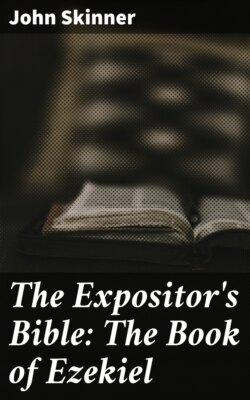Читать книгу The Expositor's Bible: The Book of Ezekiel - John Skinner - Страница 13
На сайте Литреса книга снята с продажи.
II
ОглавлениеTable of Contents
It is a relief to turn from this somewhat fantastic, though for its own purpose effective, exhibition of prophetic ideas to the impassioned oracles in which the doom of the city and the nation is pronounced. The first of these (ch. v. 5-17) is introduced here as the explanation of the signs that have been described, in so far as they bear on the fate of Jerusalem; but it has a unity of its own, and is a characteristic specimen of Ezekiel's oratorical style. It consists of two parts: the first (vv. 5-10) deals chiefly with the reasons for the judgment on Jerusalem, and the second (vv. 11-17) with the nature of the judgment itself. The chief thought of the passage is the unexampled severity of the punishment which is in store for Israel, as represented by the fate of the capital. A calamity so unprecedented demands an explanation as unique as itself. Ezekiel finds the ground of it in the signal honour conferred on Jerusalem in her being set in the midst of the nations, in the [pg 067] possession of a religion which expressed the will of the one God, and in the fact that she had proved herself unworthy of her distinction and privileges and tried to live as the nations around. “This is Jerusalem which I have set in the midst of the nations, with the lands round about her. But she rebelled against My judgments wickedly18 more than the nations, and My statutes more than [other] lands round about her: for they rejected My judgments, and in My statutes they did not walk.... Therefore thus saith the Lord Jehovah: Behold, even I am against you; and I will execute in thy midst judgments before the nations, and will do in thy case what I have not done [heretofore], and what I shall not do the like of any more, according to all thy abominations” (vv. 5-9). The central position of Jerusalem is evidently no figure of speech in the mouth of Ezekiel. It means that she is so situated as to fulfil her destiny in the view of all the nations of the world, who can read in her wonderful history the character of the God who is above all gods. Nor can the prophet be fairly accused of provincialism in thus speaking of Jerusalem's unrivalled physical and moral advantages. The mountain ridge on which she stood lay almost across the great highways of communication between the East and the West, between the hoary seats of civilisation and the lands whither the course of empire took its way. Ezekiel knew that Tyre was the centre of the old world's commerce,19 but he also knew that Jerusalem occupied a central situation in the civilised world, and in that fact he rightly saw a providential mark of the grandeur and universality of her religious mission. Her calamities, too, were probably such as no other city experienced. The terrible prediction of ver. 10, “Fathers shall eat sons in [pg 068] the midst of thee, and sons shall eat fathers,” seems to have been literally fulfilled. “The hands of the pitiful women have sodden their own children: they were their meat in the destruction of the daughter of My people” (Lam. iv. 10). It is likely enough that the annals of Assyrian conquest cover many a tale of woe which in point of mere physical suffering paralleled the atrocities of the siege of Jerusalem. But no other nation had a conscience so sensitive as Israel, or lost so much by its political annihilation. The humanising influences of a pure religion had made Israel susceptible of a kind of anguish which ruder communities were spared.
The sin of Jerusalem is represented after Ezekiel's manner as on the one hand transgression of the divine commandments, and on the other defilement of the Temple through false worship. These are ideas which we shall frequently meet in the course of the book, and they need not detain us here. The prophet proceeds (vv. 11-17) to describe in detail the relentless punishment which the divine vengeance is to inflict on the inhabitants and the city. The jealousy, the wrath, the indignation of Jehovah, which are represented as “satisfied” by the complete destruction of the people, belong to the limitations of the conception of God which Ezekiel had. It was impossible at that time to interpret such an event as the fall of Jerusalem in a religious sense otherwise than as a vehement outburst of Jehovah's anger, expressing the reaction of His holy nature against the sin of idolatry. There is indeed a great distance between the attitude of Ezekiel towards the hapless city and the yearning pity of Christ's lament over the sinful Jerusalem of His time. Yet the first was a step towards the second. Ezekiel realised intensely that part of God's character which it was needful to enforce in order to beget in his countrymen the deep horror at the sin of idolatry which characterised the later Judaism. [pg 069] The best commentary on the latter part of this chapter is found in those parts of the book of Lamentations which speak of the state of the city and the survivors after its overthrow. There we see how quickly the stern judgment produced a more chastened and beautiful type of piety than had ever been prevalent before. Those pathetic utterances, in which patriotism and religion are so finely blended, are like the timid and tentative advances of a child's heart towards a parent who has ceased to punish but has not begun to caress. This and much else that is true and ennobling in the later religion of Israel is rooted in the terrifying sense of the divine anger against sin so powerfully represented in the preaching of Ezekiel.
